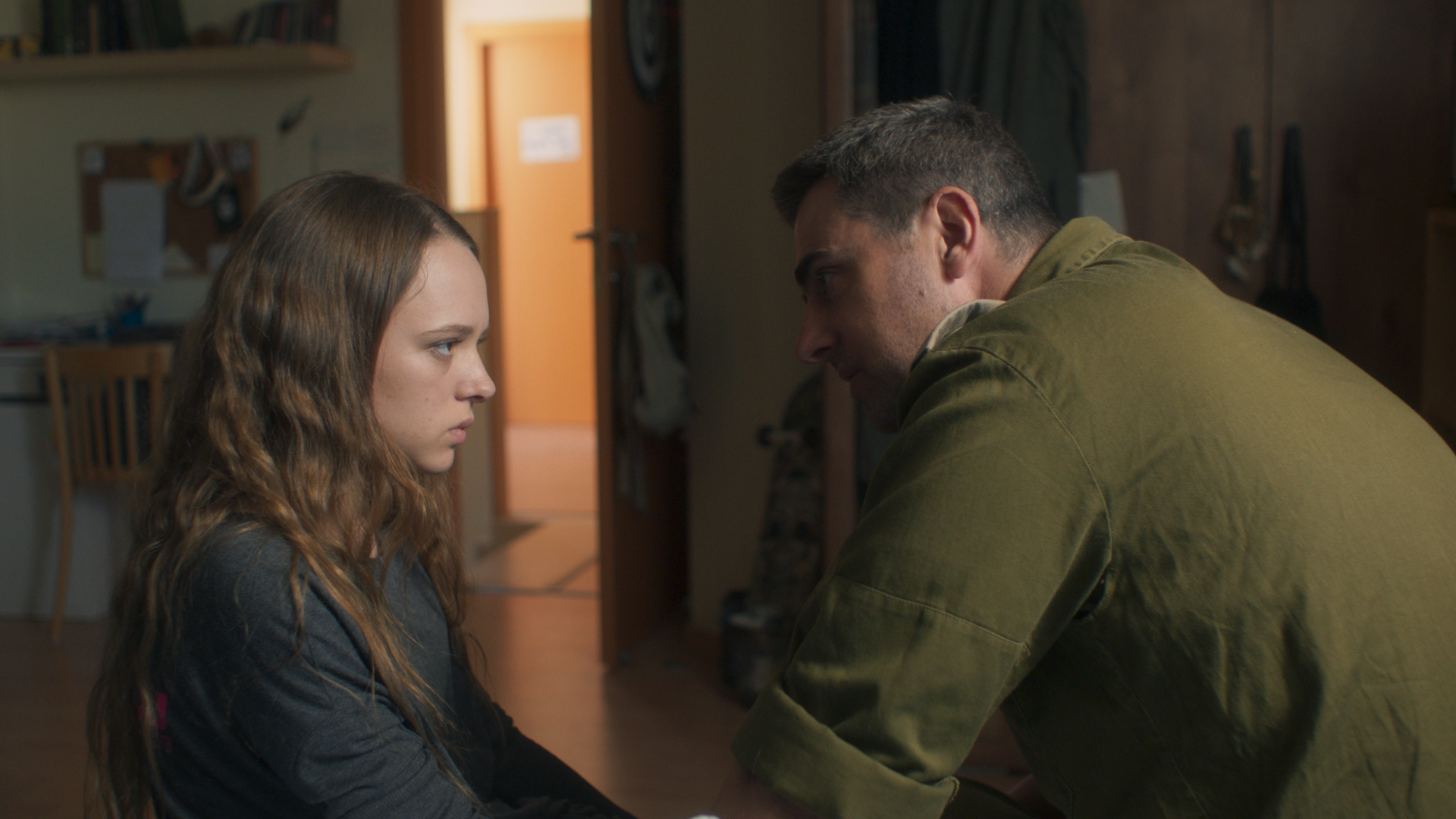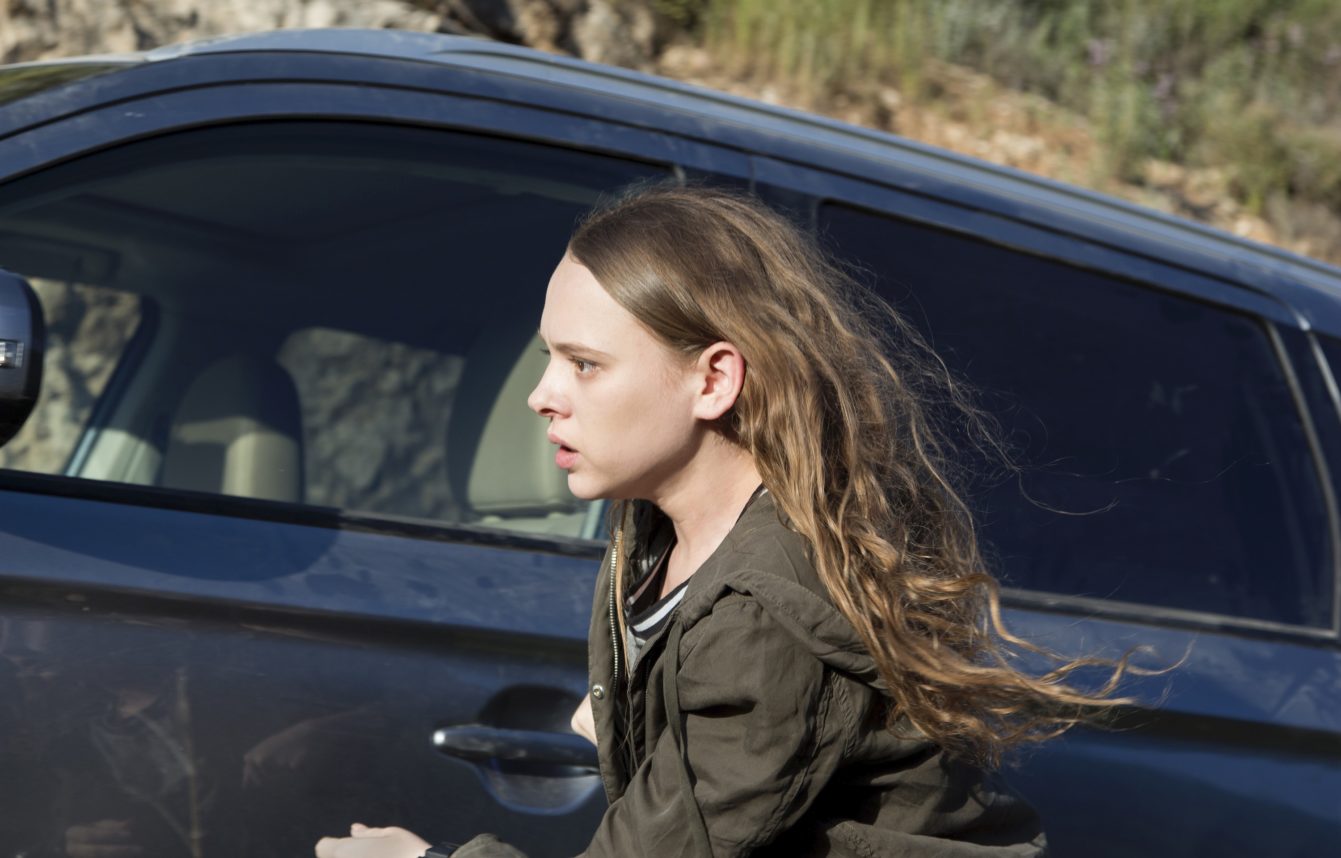
Before she came to fame on Netflix in the hit Israeli series “Shtisel” and the miniseries “Unorthodox,” actress Shira Haas starred in the acclaimed 2018 drama ‘Broken Mirrors,” for which she earned a best actress nomination for the Israeli Film Academy’s Ophir Awards. Writer-directors Imri Matalon and Aviad Givon also received a nod for their screenplay.
The film, which premieres virtually at laemmle.com on July 3, casts Haas as Ariella, a teenager whose strict army commander father (Yiftach Klein) exacts punishments harsher than her rebellious behavior merits. When he doesn’t punish her for a serious act she committed accidentally, she punishes herself in self-destructive ways to assuage her guilt. Meanwhile, flashbacks reveal her father feels guilt over an incident in his own past that continues to haunt him in the present.
“This film has always stayed with me; the subject of how our actions and words affect the people around us,” Haas told the Journal. “It’s a tough subject, of course, but my favorite things are tough subjects made with a lot of love. This movie is not about punishment. It’s a story about forgiveness. I felt the need to tell it.”
Haas said she identified with Ariella’s stubborn streak, “though she’s more hardcore than I am. She’s really mature for her age. She takes a lot of responsibility on her shoulders. That’s something I’ve felt even though I come from very different circumstances and a great family. Even as a child, I felt the responsibility to speak out for justice.”
Despite the physically intimate and emotionally raw nature of some of her scenes, Haas had faith in the filmmakers. “We had a lot of rehearsals, and when we shot it there weren’t a lot of people on the set. I felt very safe and comfortable and respected,” she said. “I wouldn’t call it easy, but it made it more comfortable to approach it. I didn’t feel any fear.”

Matalon and Aviad had auditioned 100 actresses for the role, but it was clear that Haas was the perfect Ariella “from the moment I saw her,” Matalon told the Journal, calling her “a force of nature. Working with Shira is a gift for every director. She carries this movie on her shoulders. She’s small but powerful, strong yet fragile, beautiful but not in an ordinary way. She’s a very close friend and deserves all her success. I’m sure that more will come. She’s become one of the great export products of Israel.”
Matalon said that Ariella is based on a friend from his youth who had a cruel father. “She was used to getting harsh punishments and when she didn’t get them, she would look for them herself,” he said. His father, a veteran of the Yom Kippur and Six-Day wars who suffered from post-traumatic stress disorder, inspired other elements of the story. He and film school chum Aviad, shot their debut feature in Beit Shemesh near Jerusalem and directed in tandem. “We put our egos aside as much as possible and concentrated on getting the best result,” Matalon said.
Of Ashkenazi and Sephardic heritage, Matalon grew up in the Negev kibbutz Sde Boker, and knew he wanted to make movies from the day his mother took him to see a Gila Almagor Holocaust film when he was a boy. The father of two small children, he now lives in Tel Aviv and has just finished the script for his first solo feature. Compared with “Broken Mirrors,” “It’s a bit lighter,” he said. “It’s a love story about a Jewish-Israeli girl who is in a wheelchair and her Palestinian therapist. It’s based on a true story.”
“This movie is not about punishment. It’s a story about forgiveness. I felt the need to tell it.” — Shira Haas
Coincidentally, in Haas’ upcoming mother-daughter drama “Asia,” her ALS-afflicted character is in similar physically disabled circumstances. Shot right before “Unorthodox,” it posed both physical and emotional challenges. “It’s a tough subject, death and grief, but it does it from a place of love,” Haas said. “It’s about not taking life and the people we care about for granted.” She was named best actress at the Tribeca Film Festival for the role. A winter release is planned.
Meanwhile, Haas is looking forward to shooting Season 3 of “Shtisel,” which was put on hold by the COVID-19 pandemic. Contractually unable to reveal details, she described it as “an amazing season. Really powerful. I cried a few times when I read the script and I’m not usually a crier.”
Hass, who spent her 25th birthday in May celebrating via Zoom with loved ones, admitted she hasn’t minded staying home. “I wish the circumstances were different, of course. I was really scared. I still am sometimes. But I keep myself busy,” she said, confirming that other projects are in the works, but adding, “nothing official yet.”
With the Emmy Awards nominations set to be revealed July 28, “Unorthodox” is receiving major buzz, and so is Haas’ performance. “I’m very grateful to be named in some predictions, but I’m living in the here and now,” she said. She acknowledged that her roles in the Israeli films “Princess,” “Foxtrot,” “A Tale of Love and Darkness,” and especially “Broken Mirrors” were great preparation for roles that came after.
“I learned so much from the directors and it made me a better actor for the next film. It’s like a ladder, you know? ‘Broken Mirrors’ was such a huge and meaningful role for me. I took so much from it,” she said. “Even though I’m young, I’ve done a few projects through the years and it’s prepared me for the next step. All these roles are so different from one another, and I’m happy that people will see a different side of me and also discover the people who made them.”
“Broken Mirrors” premieres July 3 here.

































 More news and opinions than at a Shabbat dinner, right in your inbox.
More news and opinions than at a Shabbat dinner, right in your inbox.